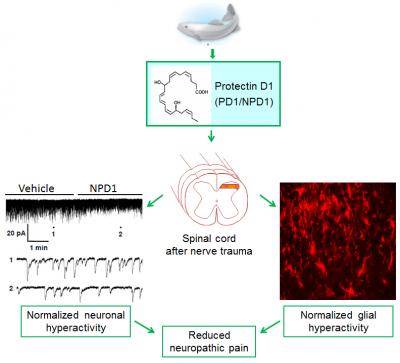|
Uncovering a healthier remedy for
chronic pain
DURHAM, N.C. -- Physicians and patients who are wary of
addiction to pain medication and opioids may soon have a
healthier and more natural alternative.
A Duke University study revealed that a derivative of DHA (docosahexaenoic
acid), a main ingredient of over-the-counter fish oil
supplements, can sooth and prevent neuropathic pain caused by
injuries to the sensory system. The results appear online in the
Annals of Neurology.
The research focused on a compound called
neuroprotectin D1=protectin D1 (NPD1=PD1), a bioactive lipid
produced by cells in response to external stimuli. NPD1=PD1 is
present in human white blood cells, and was first identified
based on its ability to resolve abdominal and brain
inflammation.
"These compounds are derived from omega-3
fatty acids found in fish oil, but are 1,000 times more potent
than their precursors in reducing inflammation," said Ru-Rong Ji,
professor of anesthesiology and neurobiology at Duke University
Medical Center and principal investigator of the study.
The team used laboratory mouse models of
nerve injuries to simulate pain symptoms commonly associated
with post-surgical nerve trauma. They treated these animals with
chemically-synthesized NPD1=PD1, either through local
administration or injection, to investigate whether the lipid
compound could relieve these symptoms.
Their findings revealed that NPD1=PD1 not
only alleviated the pain, but also reduced nerve swelling
following the injuries. Its analgesic effect stems from the
compound's ability to inhibit the production of cytokines and
chemokines, which are small signaling molecules that attract
inflammatory macrophages to the nerve cells. By preventing
cytokine and chemokine production, the compound protected nerve
cells from further damage. NPD1=PD1 also reduced neuron firing
so the injured animals felt less pain.
Ji believes that the new discovery has
clinical potential. "Chronic pain resulting from major medical
procedures such as amputation, chest and breast surgery is a
serious problem," he said. Current treatment options for
neuropathic pain include gabapentin and various opioids, which
may lead to addiction and destruction of the sensory nerves.
On the other hand, NPD1=PD1 can relieve
neuropathic pain at very low doses and, more importantly, mice
receiving the treatment did not show signs of physical
dependence or enhanced tolerance toward the lipid compound.
"We hope to test this compound in clinical
trials," Ji said. The initial stages of the trial could involve
DHA administration through diet and injection. "DHA is very
inexpensive, and can be converted to NPD1 by an
aspirin-triggered pathway," he said. The ultimate goal is to
develop a safer approach to managing chronic pain.
|
|
How Protectin D1 Works
|
 |
A compound
derived from the DHA in fish oil -- Protectin D1
(PD1/NPD1) -- offers protection from nerve
trauma-induced neuropathic pain by preventing neuronal
and glial hyperactivity in the spinal cord. Glial cells,
when activated, produce proinflammatory cytokines that
may further damage the nerve cells.
(Credit: Ru-Rong Ji and Zhen-Zhong
Xu, Duke University Medical Center)
Story Source:
The above story is reprinted from materials provided by
Duke University, via EurekAlert!, a service of AAAS.
Acid Reflux Drug May Cause Heart
Disease, According to Study
July 19, 2013 --
Drugs prescribed to millions of people to cope with acid reflux
may also cause cardiovascular disease, report scientists from
Houston Methodist Hospital and two other institutions.
Proton pump inhibitors, such as Prilosec,
Prevacid and Nexium, are used to treat a wide range of stomach
disorders, most notably gastroesophageal acid reflux, or severe
heartburn. Available both over the counter and with a
prescription, they are the third highest-selling class of drugs
in the United States.
"The surprising effect that PPIs may
impair vascular health needs further investigation," said John
Cooke, M.D., Ph.D., the study's principal investigator. "Our
work is consistent with previous reports that PPIs may increase
the risk of a second heart attack in people that have been
hospitalized with an acute coronary syndrome. Patients taking
PPIs may wish to speak to their doctors about switching to
another drug to protect their stomachs, if they are at risk for
a heart attack."
|
Story Source:
The above story is from materials
provided by Methodist Hospital, Houston.
|
| |
|
← Back to News |
|